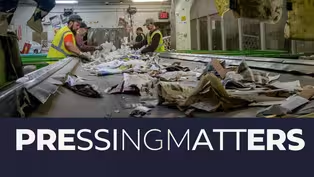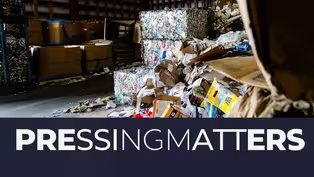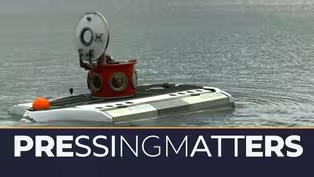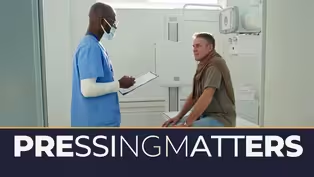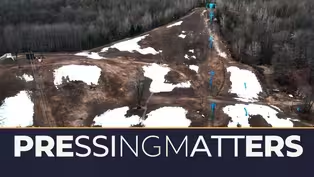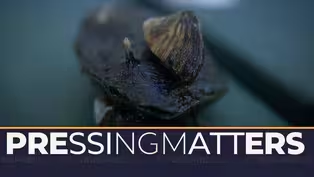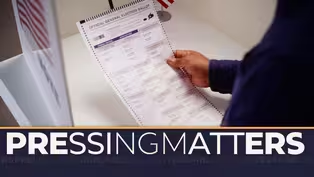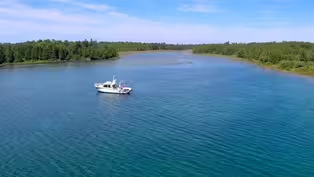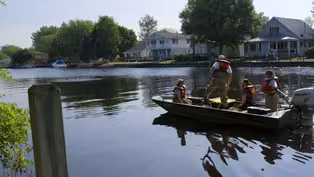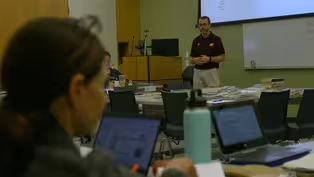Pressing Matters
Pressing Matters | Extended Producer Responsibility (EPR) what is it?
Clip: Season 1 | 12m 2sVideo has Closed Captions
We discuss Extended Producer Responsibility
In recent years efforts have increased to have manufacture play a bigger role in boosting recycling numbers and reduce landfill waste. Pressing Matters Stefanie Mills sits down with Kerrin O’Brien from Michigan Recycling Coalition to discuss Extended Producer Responsibility – a policy that would put some fiscal responsibility of recycling infrastructure in the hands of producers of the consumers
Problems playing video? | Closed Captioning Feedback
Problems playing video? | Closed Captioning Feedback
Pressing Matters is a local public television program presented by WCMU
Pressing Matters
Pressing Matters | Extended Producer Responsibility (EPR) what is it?
Clip: Season 1 | 12m 2sVideo has Closed Captions
In recent years efforts have increased to have manufacture play a bigger role in boosting recycling numbers and reduce landfill waste. Pressing Matters Stefanie Mills sits down with Kerrin O’Brien from Michigan Recycling Coalition to discuss Extended Producer Responsibility – a policy that would put some fiscal responsibility of recycling infrastructure in the hands of producers of the consumers
Problems playing video? | Closed Captioning Feedback
How to Watch Pressing Matters
Pressing Matters is available to stream on pbs.org and the free PBS App, available on iPhone, Apple TV, Android TV, Android smartphones, Amazon Fire TV, Amazon Fire Tablet, Roku, Samsung Smart TV, and Vizio.
Providing Support for PBS.org
Learn Moreabout PBS online sponsorshipWe've talked a lot about recycling and what happens to it after we take it to the curb, but what about plastic producers.
In recent years, efforts are increasing to have manufacturers play a bigger role in boosting recycling numbers and reduce landfill waste.
So to learn more about that, we have Kerrin O'Brien in our studio to talk about the Extended Producer Responsibility Policy.
Now, Kerrin, you are with the Michigan Recycling Coalition.
- Yeah.
- Tell me a little bit about your role there and the role of your agency.
- Yeah, and so I am the Executive Director of the Michigan Recycling Coalition, which is a statewide recycling organization, a membership based nonprofit association and advocate for recycling.
So we really started out in 1982 with recycling professionals as it was just growing.
You know, the first kind of the beginning of recycling these professionals came together to say, "Let's try to work collectively to advance recycling."
And so that's what we've been doing for the past 42 or so years.
And we have an annual conference every year, and in recent years we've been really working on policy because that's where the action really needs to take place.
- Well, and so speaking of the policy, one of your priorities right now is EPR, which is of course Extended Producer Responsibility.
What exactly is it?
- Yeah, so Extended Producer Responsibility is a way to make producers responsible for some aspect of the end of life costs of their products.
Producer responsibility is happening in Europe, in Canada, in India, in many places around the world, frankly.
And it is a way, well, how it manifests is that producers of consumer goods and paper products, newspapers, cups and glasses and bottles, the stuff you see in your recycling bin.
- [Stephanie] So real quick, it goes beyond plastic?
It's- - Oh, yes.
- It's paper, it's cardboard, it's, okay, collect.
- Yes, it's your basic consumer goods, like I said, what you're throwing away in your garbage, what you're putting in your recycling bin.
And so whether or not those materials are recycled, the producers of those products would pay per item into a fund.
And that fund then would be used to pay for recycling across the state.
And so thereby reducing the financial burden of that kind of programming on local governments and taxpayers.
- Learning more about recycling, I'd never heard of EPR and it really sounds very interesting.
But how do you define a producer?
What are they- - The producers are really the brands.
And so, you know, in Michigan we have a bottle bill, so we're not talking about Coca-Cola or Pepsi, because those are taken care of through a different system.
But we are talking about in Michigan specifically, Kellogg, we're talking about cereal boxes.
We're talking about, you know, sauce jars, and pickle jars, and soup cans, and laundry detergent jugs.
So we're talking about the stuff that we use in our households every single day.
Whether or not those materials are recycled, those producers, those brands, many of them would have to pay into that fund.
- Are there any incentives or penalties to help, you know, with compliance for producers?
- So the fee, so this is a fee, for example, if we're talking about a ketchup bottle is like 0.001 cents per ketchup bottle.
And if that ketchup bottle is made from recycled content and is recyclable then they're paying the lowest fee.
If that ketchup bottle can't be recycled or there's some problem with that, they would pay a much higher fee.
You know, 0.10 cents instead of 0.001, we don't know exactly what those, you know, figures are going to be, but we're talking about very, very minute amount of money per item.
Probably wouldn't affect the consumer cost.
- This has to be a tricky question, but how might this be enforced?
- Yeah, that is a tricky question.
And frankly, as we're talking about legislative language, it's probably gonna have to be enforced at the Attorney General level, state of Michigan.
Because if you have one producer refusing to pay, then you have to hold them accountable.
And how you hold them accountable is to say, "Sorry, you can't sell your products here in Michigan if you're not willing to pay into our system."
- Myself included in this next question.
We all wanna feel like we're doing our part to better protect the environment.
So how could EPR help with that?
- So in reality, Michigan as a state really just started to seriously invest in recycling in recent years.
You know, in the 80s and early 90s we had a big bond effort to get some recycling started, but that was a moment in time.
In 2018 was the first time we passed regular annual ongoing funding for recycling through the legislature.
So it's only been in the past, you know, six years that we've tried to fund something in a meaningful way.
But if we are really to develop a circular economy and do things differently, the investment has gotta be much more significant.
- Yeah, so what about costs?
Could we see an increase in prices for certain products in recycling?
How might that work?
- Yeah, you know, I think of it as a much more equitable way to spread the cost of end of life management.
The end of life management of materials is really invisible to us.
The stuff that gets picked up at your curb, you don't see again, it's not my problem.
- [Stephanie] Right.
- It goes away.
But there are costs to society for that, landfills leak, have problems, nobody wants them in their backyard.
So, and frankly, we can use those materials much more productively over and over again.
If we had a system in place to put them back into the system.
The costs on that one product, if you're not buying that product, you shouldn't have to pay for disposing of that product.
And so this is a way of internalizing the lifecycle cost into that product.
So if you're not buying it, that's not included, but if you are buying it, it's included in the cost of the product.
- Got it.
- But like I say, we're talking about really small costs per item that add up into, you know, so eventually that cost would be counteracted by the fact that you don't have to pay for recycling services.
- [Stephanie] Let's talk about job opportunities.
Could there be more jobs, job creation within the recycling and waste management system that could come from this?
- Most definitely.
The kind of waste, recycling, reuse economy is very significant.
I believe $33 billion annually in Michigan is generated.
And there's some big numbers behind that.
It rivals tourism in Michigan if you really dig down into it.
And it's an invisible industry.
And so if we really are investing in a significant way to assure that all Michiganders get the services and access they need to really pull materials outta households and from businesses, and put them back into businesses, because frankly, these businesses want that material back so they can make new products.
That is their motivation.
If they're gonna have to be, you know, on the hook for this kind of commitment, then they want that material back so they can use it again.
- Right.
And I think that's almost a selling point too, to a lot of products that you see that, oh, you know, this is a plastic cup, but hey, we use recyclable materials to make this product, right?
- Yes.
- And so, like as a consumer, you're like, "Okay, so something was done with the environment in mind, I guess, right?"
- [Kerrin] Yeah.
And if you think about it, all of the plastic that has ever been produced on this planet since it was invented is still here with us in some way.
Big forms, teeny little forms.
And it is becoming a human health and environmental hazard.
And so the plastics industry is really hyper aware of this fact, and they know their liabilities could grow if they don't find a way to harness and use that material over and over so that we don't have these problems in the future.
- [Stephanie] Right.
And that's a really good point.
You're seeing a lot more articles about microplastics showing up in people's blood work.
I mean, they're so tiny.
People are eating them are, you know, animals are eating them and ingesting them.
So you're right, you're right, you're absolutely right.
You mentioned earlier, there are other states, other countries that have implemented EPR type policies.
Do you know what kind of results and challenges that they might be seeing with that?
- Yeah, so I was recently traveling to Vancouver to learn more about the British Columbia system, which is the first system in North America to take on EPR.
And they have I think a recovery rate well over 70%.
They've invested heavily in the system.
They're now beginning to track all the different types of plastic packaging that are out there so that they can advance the system.
You know, we've got all those poly coated bags now that we can't recycle here yet.
But with their kind of work, we're figuring that out.
They are one of the systems in Canada that has what is called a full EPR system.
That is the producers pay for all of recycling, whereas other parts of Canada, it's partial.
So government pays for part of it, producers pay for part of it.
Canada is moving, many of the provinces are moving to that full system, so they can have better programming, because you just have to invest.
So they're sold on it and they're going in deeper.
- Speaking of Canada, - Yeah.
- [Stephanie] Michigan still takes in a lot of trash from other states and Canada.
So could EPR change that?
- EPR is not likely to change that immediately, but I will say that in 2022, we led an effort to change Michigan and solid waste laws.
And those solid waste laws were really predicated on making sure we had enough disposal capacity.
And if a county didn't have disposal capacity, then they had to make way for the development of disposal capacity.
And that policy- - What's the disposal?
- Disposal capacity is like a landfill.
- [Stephanie] Okay, that's what, I just wanted to double check.
- Yep, so if your landfill didn't have 5.5 years of disposal capacity, then you had to make way for the development of additional capacity.
And unfortunately, that policy was very successful in developing lots of disposal capacity in Michigan, which artificially lowers the price of disposing here.
And that's part of our issue is that we're cheap.
Landfilling is cheap here in Michigan.
It's hard for recycling and composting to compete.
25% of our waste comes from out of state and it needs to change.
So the policy change that we did in 2022 is gonna slowly turn that boat, and we're gonna probably lessen the expansion of landfills.
And that will help in that way.
- Yeah, this was really interesting.
And thank you for all you do, and thanks for making the trip up here today.
- [Kerrin] Thank you.
Pressing Matters | What happens when the recyclables are picked up?
Video has Closed Captions
Clip: S1 | 9m 20s | Our knowledge about what happens to the items we recycle stops once we get it out of the house. (9m 20s)
Pressing Matters | Extended Producer Responsibility (EPR) what is it?
Video has Closed Captions
Clip: S1 | 12m 2s | We discuss Extended Producer Responsibility (12m 2s)
Pressing Matters | A New Era of Exploring the Great Lakes
Video has Closed Captions
Clip: S1 | 7m 58s | Pressing Matters Examines A New Era of Exploring the Great Lakes (7m 58s)
Pressing Matters | Rising Cancer Rates in younger Adults
Video has Closed Captions
Clip: S1 | 12m 1s | Pressing Matters examines Rising Cancer Rates in younger Adults (12m 1s)
Pressing Matter |Climate Change Forces Business to Adapt
Video has Closed Captions
Clip: S1 | 5m 56s | Pressing Matters examines how Climate Change Forces Business to Adapt (5m 56s)
Pressing Matters | Invasive species
Video has Closed Captions
Clip: S1 Ep4 | 8m 2s | Pressing Matters | They're Destructive and a nuisance. (8m 2s)
Pressing Matters | Election Day
Video has Closed Captions
Clip: S1 Ep4 | 15m 48s | What you need to know before heading to the polls, on Pressing Matters. (15m 48s)
Video has Closed Captions
Clip: S1 Ep1 | 8m 41s | Water Quality and PFAS in Michigan's water ways. (8m 41s)
Video has Closed Captions
Clip: S1 Ep1 | 9m 20s | Exploring microplastics in our water (9m 20s)
Artificial Intelligence in the Classroom
Video has Closed Captions
Clip: S1 Ep1 | 6m 55s | Artificial Intelligence in the Classroom (6m 55s)
Providing Support for PBS.org
Learn Moreabout PBS online sponsorship
- News and Public Affairs

Top journalists deliver compelling original analysis of the hour's headlines.

- News and Public Affairs

FRONTLINE is investigative journalism that questions, explains and changes our world.












Support for PBS provided by:
Pressing Matters is a local public television program presented by WCMU
